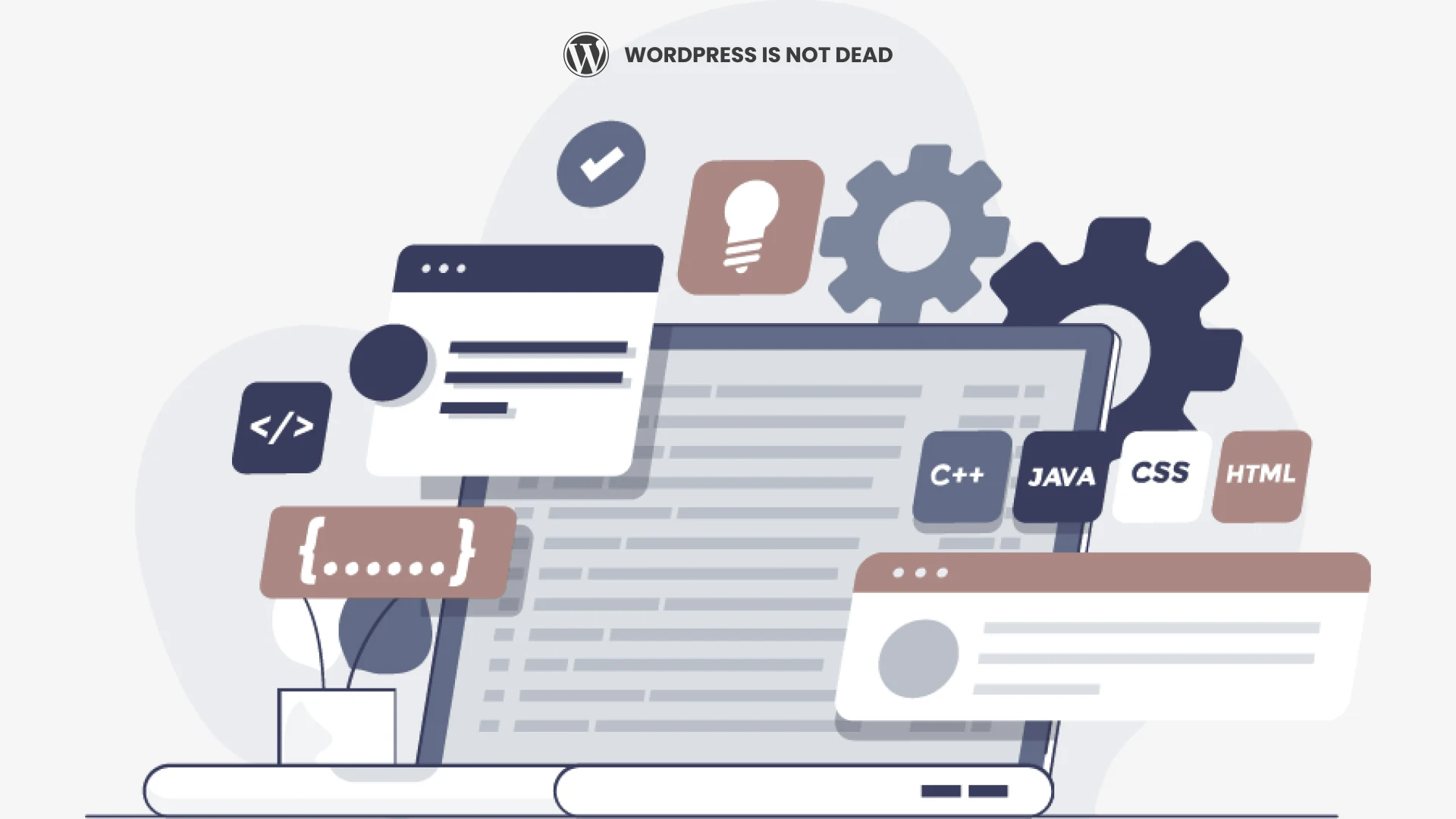WordPress is easily regarded as one of the most popular content management systems (CMS) in the world. While some may argue that WordPress is outdated and losing its relevance, the truth is far from it. In fact, WordPress continues to dominate the market and remains a go-to choice for website owners and developers alike.
Why WordPress is NOT Dead
When it comes to choosing a CMS, WordPress holds a significant market share and is considered the most popular option available. With over 60% market share, WordPress powers a staggering number of websites on the internet. This sheer dominance is a testament to its reliability and versatility. WordPress caters to the needs of all types of users, whether beginner or advanced and offers an extensive range of features and plugins to enhance website functionality and design.
High Level of Technical Control
One of the key reasons why WordPress remains relevant is its high level of technical control. Unlike other platforms, WordPress is built on open source software and utilizes PHP as its core programming language. This open source nature allows users to have complete control over their website’s functionality and design, beyond the default settings provided by the platform. WordPress users can leverage their technical expertise and customize their website according to their specific requirements, making it a favored choice among developers and website owners.
Compatibility Factor of WordPress
Another critical factor that sets WordPress apart and contributes to its relevance is its compatibility with various plugins, themes, hosting providers, and HTML. WordPress seamlessly integrates with a wide range of plugins, allowing website owners to add extra functionality and features to their businesses. Additionally, the platform’s extensive collection of themes enables users to customize the design and appearance of their website without needing expertise in web development. Whether e-commerce, blogging, or portfolio websites, WordPress offers compatibility and integrations catering to diverse needs.
Wide Array of Options Available for Users
In addition to its technical control and compatibility, WordPress offers users a wide array of options for website design and development. Here are a few notable options:
- WordPress design and development services allow users to create unique and visually appealing websites that align with their brand and business needs.
- The Elementor website builder plugin is an excellent tool for beginners and experienced users alike, providing a drag-and-drop interface and customizable website layouts.
- WordPress themes, both free and premium, offer users countless design options and templates to create stunning and professional websites.
- The extensive plugin directory provides users with a vast ecosystem of plugins, ranging from SEO tools, e-commerce solutions, and social media integrations, offering additional functionality and customization options.
WordPress is Open Source
WordPress is open source meaning it is accessible to all and FREE. WordPress’s role in open source development extends beyond its immediate community, making it an essential player in the broader Internet ecosystem. Here’s how WordPress contributes to open source development:
- As an open-source software, WordPress fosters collaboration and community-driven innovation, enabling developers and users globally to contribute to its core development and enhance features, security, and functionality.
- WordPress’s open-source values, centered on transparency and accessibility, empower users and developers to explore, customize, and distribute their creations, fostering a spirit of open sharing and collaboration.
- WordPress’s commitment to open source development and its active participation in the open source community ensure continuous improvement, adaptability, and long-term sustainability.
- The open-source nature of WordPress influences and shapes the broader direction and progress of internet development, further solidifying its position as a leader in the CMS landscape.
The Continued Dominance of WordPress
Despite the emergence of new CMS platforms like Framer, Webflow etc. WordPress continues to maintain its dominance in the market. This long-standing position can be attributed to multiple factors, including its market share and the robustness of its community. WordPress’s market share, which exceeds 60% of all websites on the internet, showcases its continued popularity and trust among users.
Overview of Current CMS Trends
To understand the dominance of WordPress, it is essential to gain an overview of current CMS trends and market share. Here are some noteworthy trends:
- WordPress remains the most popular CMS, claiming a significant market share and outpacing its competitors.
- While new CMS platforms like Shopify have gained attention, WordPress’s market share and long-standing reputation make it a formidable competitor.
- The flexibility and scalability of WordPress make it an ideal choice for both small businesses and large enterprises, ensuring its continued relevance and market share.
- WordPress’s open-source nature fosters community-driven innovation and regular updates, further solidifying its position as a market leader.
- The continuous development and enhancements of WordPress core and its plugin ecosystem showcase its adaptability and commitment to meeting user demands.
Understanding the Role of WordPress in Today’s Digital Landscape
In today’s digital landscape, where SEO and mobile responsiveness are paramount, WordPress plays a pivotal role. Here’s why:
- WordPress offers SEO-friendly features and plugins, enabling users to optimize their website’s content, meta descriptions, and URLs for better visibility and ranking on search engines like Google.
- The platform’s focus on responsive design and mobile optimization ensures that websites built with WordPress are accessible and readable across devices, catering to the growing number of mobile internet users.
- WordPress’s widespread usage and support contribute to its ability to evolve and adapt to changing trends and demands of the internet, making it a reliable choice for website owners and developers alike.

Benefits of WordPress Page Builders
While WordPress offers a variety of design options, the advent of page builders has further enhanced website development and design capabilities. Page builders like the popular Elementor website builder plugin provide users with several benefits, including:
- Flexibility in website design and customization, empowering users to create unique and visually appealing layouts without the need for coding.
- Intuitive and user-friendly drag-and-drop interfaces that make website development accessible for beginners and experienced users alike.
- Efficiency in website creation, with drag-and-drop functionality and pre-designed templates that streamline the design process.
- Enhanced functionality through plugin integrations, allowing users to add features and functionality to their website seamlessly.
While other CMS like Squarespace and WIX also offer drag-and-drop capabilities, they limit you extremely with what you can do once you become more experienced with technical aspects like enhancing the speed and SEO capabilities of your website.
Technical Aspects of WordPress
While WordPress is essentially limitless in terms of design and development, it also shines in its technical capabilities and features. The technical aspects of WordPress, such as its core functionality and open source nature, contribute to its continued relevance and popularity. The platform’s SEO capabilities have made it a favorite among website owners and digital marketers.
WordPress SEO Capabilities
SEO experts like Craig Campbell regard WordPress as one of the best site builders. WordPress offers a wealth of SEO capabilities and tools that empower website owners to optimize their site’s visibility on search engines like Google. Here’s how WordPress enhances SEO:
- The availability of SEO plugins, such as Yoast SEO and Rank Math, allows users to optimize their website’s content, keywords, meta titles, and meta descriptions easily.
- WordPress’s user-friendly dashboard simplifies SEO implementation, enabling website owners to focus more on creating quality content and less on technical SEO tasks.
- Plugins and tools within the WordPress community assist website owners with keyword research, monitoring website rankings, and generating SEO reports, streamlining the SEO process for better results.
- SEO-friendly URLs and permalinks contribute to improved website visibility, as search engines prioritize websites with user-friendly and informative URLs.
Security Measures in WordPress
Security is a vital aspect of any website, and WordPress ensures that website owners have the necessary measures and tools to safeguard their online presence. Here’s how WordPress addresses security concerns:
- WordPress regularly updates its core software to address vulnerabilities and enhance security, making it more resistant to attacks and ensuring website owners benefit from the latest security features.
- Password protection and email verification measures add an extra layer of security, preventing unauthorized access to WordPress websites.
- The WordPress community actively addresses security concerns and offers solutions, providing website owners with a support system to deal with security threats effectively.
- Plugins and directory restrictions within the WordPress ecosystem minimize potential security vulnerabilities, giving website owners peace of mind when it comes to their site’s security.
- Secure hosting and server configurations are crucial for safeguarding a WordPress site, and users can choose from a wide range of hosting providers that specialize in WordPress security and performance.
WordPress vs. Emerging CMS Platforms
As new CMS platforms emerge, there are legitimate concerns about whether they pose a real threat to WordPress’s market share and dominance. However, several factors mitigate competition and firmly establish WordPress as a leading CMS:
Analyzing the Competition
- WordPress maintains a substantial market share, surpassing its competitors and solidifying its position as the preferred CMS for website owners and developers.
- Renowned industry experts, such as Joost de Valk, founder of Yoast SEO, continue to endorse WordPress, reinforcing its credibility and dismissing emerging platforms as genuine threats.
- WordPress offers a vast ecosystem of plugins and themes, providing users with unmatched functionality and customization options, a feature that sets it apart from emerging CMS platforms.
- Cloud-based CMS, like Shopify, has its own strengths, catering primarily to e-commerce websites, but WordPress’s versatility, scalability, and ease of use make it a popular choice for various website types and industries.
- WordPress’s long history, extensive community, and dedicated user base create a strong network and support system, minimizing the impact of emerging platforms, and ensuring its ongoing market dominance.
Is there a Real Threat to WordPress?
Despite new and emerging platforms, WordPress’s market share and long-standing reputation mitigate any real threat to its dominance. Here’s why WordPress remains secure:
- Market share data consistently shows that WordPress maintains a substantial presence, outperforming emerging and established CMS platforms.
- WordPress’s community, plugin ecosystem, and vast library of themes contribute to its robustness and popularity, making it difficult for emerging platforms to compete effectively.
- While there may be niche areas where emerging platforms excel, WordPress’s versatility and ability to cater to a wide range of website types and business needs ensure that it remains the preferred choice for most website owners and developers.
- WordPress’s continued investment in development and new features, coupled with its open source nature, allows it to evolve and adapt to changing market dynamics, reinforcing its position as the market leader.
Conclusion
In conclusion, WordPress continues to be a powerful and relevant platform for website development and content management. Its high level of technical control, compatibility factor, and wide array of options make it a preferred choice for many users. Despite the emergence of new CMS platforms, WordPress maintains its dominance in the digital landscape. The flexibility and efficiency of WordPress page builders further enhance its appeal. With its SEO capabilities, security measures, and the opportunity to be in control of every aspect of your website, WordPress remains a robust and dependable platform.
Frequently Asked Questions
Is WordPress Losing Popularity?
No, WordPress is not losing popularity. With over 40% of all websites on the internet powered by WordPress, it continues to be a dominant platform. Constant updates and new features ensure its evolution and make it a preferred choice for businesses and individuals.
Is WordPress going away?
No, WordPress is not going away anytime soon. Its long-term presence and market dominance, coupled with its thriving community, solidify its position as a leading CMS. WordPress’s open source development and continuous improvements ensure that it evolves with changing technology and user demands. The dedicated and passionate WordPress community, comprising developers and users, contributes to its development, growth, and long-term sustainability. As long as there is a need for versatile, scalable, and user-friendly website solutions, WordPress will remain a top choice for website owners and developers.
Is WordPress still relevant in 2024?
Yes, WordPress remains relevant and will continue to be so in 2024. With recent updates and continuous improvements, WordPress adapts to market trends and evolving website needs. The platform’s market share, community support, and vast ecosystem, including plugins and themes, ensure its continued relevance and popularity. Its versatility, scalability, and user-friendly interface make it an ideal choice for website owners of all types, whether individuals, small businesses, or enterprises. As long as website owners seek customizable, SEO-friendly, and feature-rich websites, WordPress will remain a top contender in the CMS landscape.


